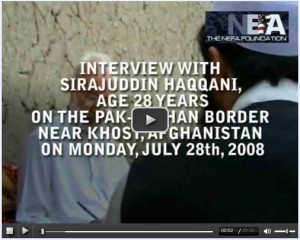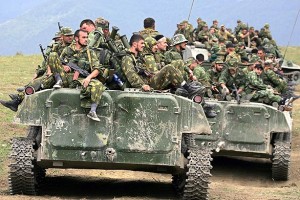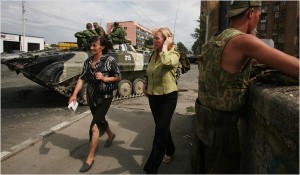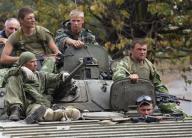Completely aside from any political point or campaign (TCJ is conservative), and in spite of having lost readers and links because of our stand, The Captain’s Journal has made it clear for more than half a year that the security situation in Afghanistan is degrading. We have pointed out that many NATO troops operate under rules of engagement that prevent them from participating in any offensive operations, that NATO has no coherent strategy of engagement with and provision of security for the population, and that the Taliban, once restricted primarily to asymmetric operations, have been able to field hundreds of fighters in heavily conventional operations such as the battle of Wanat, in a raging battle that U.S. soldiers describe as pure chaos.
While U.S. Army intelligence and senior command in Afghanistan was denying that there would be a spring offensive, we were describing the dual front strategy of the Taliban (with the Taliban directed towards Afghanistan, and the Tehrik-i-Taliban directed towards Pakistan, but assisting the Taliban), and the choking of NATO supplies through the Khyber Pass and Torkham Crossing (and even down to Karachi). None of this is to deny that U.S. soldiers (and Marines) have fought bravely and efficiently, but we have always claimed that we needed to increase the force size. The Financial Times has a sobering commentary on the Taliban creeping closer to Kabul that runs in the same theme as our reports.
Maidan Shah is a 30-minute drive from central Kabul, but locals say the mobile phone masts on a dusty hillock on the edge of town mark the beginning of Taliban territory.
The town is the capital of Wardak, one of several provinces to the south, west and east of Kabul where the Taliban are successfully stripping away support among ordinary Afghans for their government and the foreign troops that keep it in power.
Taliban commanders have been boasting for some time about their plan to surround the capital. And analysts say recent events are strikingly similar to the successful attempt by mujahideen “holy warriors” to cut off the Afghan capital in the early 1990s after the Soviet withdrawal in 1989.
“It’s rather like reading a book that seems familiar and realising that you have read it all before,” says Peter Jouvenal, a journalist who covered the conflicts of the 1980s and 1990s and now lives in Kabul.
In the early 1990s Gulbuddin Hekmatyar, an Islamist leader still at large today, choked off supplies to the capital, where the communist government left behind after the Soviet withdrawal in 1989 struggled to stay in office. Working with the Taliban, he repeated the trick in 1996 as they again laid siege to the city.
“It is a very old and effective tactic,” says Ahmed Rashid, a Pakistani expert on Afghanistan and the Taliban. But one, he adds, that this time is aimed as much at the US and its Nato allies as the government in Kabul. “They are not trying to take cities, but this is a strategic offensive to gain as much ground as possible in the gap between the US presidential election and the next administration getting into office.
“They want to paralyse the Afghan government, create a crisis within Nato and force the west to negotiate in the spring.”
Haji Mohamad Hasrat Jan, head of the provincial council, says the government has lost its grip on Wardak over the past 12 months and now controls only the provincial capital. “The police, officials and MPs are afraid to go out into the districts because they are all in Taliban hands,” he says. “Even in the district centres authority does not stretch outside the official compounds.”
This report is eerily similar to our previous discussions about Afghani citizens working for NATO forces who were fearful for their lives and begging for protection, afraid to leave the gates of FOBs even to travel home to their families.
There are a host of reports on the situation that point to problems with poppy and a narco-state, corruption in government, the re-emergence of warlords, the ineptitude of the central authorities, the lack of infrastructure, the killing of aid workers, and other disheartening trends and events. But Reuters recently published an article that explains why the security situation is degrading.
Afghans believe the United States knows about al Qaeda bases in Pakistan, but does not hit them because it wants an unstable Afghanistan to justify its presence for wider regional goals, a state newspaper said on Wednesday.
While many Afghans have vented such thoughts for some time, it was the first time a state newspaper which generally reflects the government’s view has expressed them, and may point to a souring of relations between Afghanistan and its biggest backer.
Ties between Afghanistan and Pakistan, both major U.S. allies in its war against Islamic militants, have hit new lows with the Afghan government accusing Pakistan of funding and training Taliban and al Qaeda fighters for cross-border attacks.
Nearly seven years after U.S.-led and Afghan forces overthrew the Taliban government for refusing to hand over al Qaeda leaders behind the Sept. 11 attacks, the heads of the militant groups are still at large and are thought to be hiding in Pakistan.
With more than 70,000 mainly Western troops based in Afghanistan, many Afghans believe the United States and its allies are deliberately not doing enough to halt the threat.
The United States always said it would attack the militants wherever they were, but in reality it has not done so, the state-run Anis daily said.
“The Afghan people have long doubted such claims of foreigners, especially of Britain and America, and their trust about crushing al Qaeda and terrorism has fallen,” Anis said.
The perspective suffers from the “man on the moon” problem.
The troubles of the United States in Iraq have been blamed on many causes: too few troops, wrong strategies, flawed intelligence, a very stubborn commander-in-chief.
The Man on the Moon rarely rates a public mention.
But the Man on the Moon looms so large in relations between the U.S. and 28 million Iraqis that every U.S. field commander knows his job would be easier if no American had ever set foot on the moon.
The Man on the Moon even gets a specific mention in the counterinsurgency manual the U.S. Army and the Marine Corps adopted last December. It is now taught at every U.S. military college and has the following passage:
“U.S. forces start with a built-in challenge because of their reputation for accomplishment, what some call ‘the man on the moon syndrome.’ This refers to the expressed disbelief that a nation able to put a man on the moon cannot quickly restore basic services.
“In some cultures, failure to deliver promised results is automatically interpreted as deliberate deception rather than good intentions gone awry.”
While the “man on the moon” problem was learned by U.S. forces in Iraq, it is equally applicable to Afghanistan. The people of Afghanistan don’t realize that NATO has no overarching counterinsurgency strategy, or that many of the 70,000 troops cannot fire their weapons except in self defense. All they see is a degrading security situation, and since America is capable of anything if it can land a man on the moon, then there must be an ulterior motive, or so the Afghan people think.
There you have it – the reason we are losing in Afghanistan, in spite of the hard efforts and blood, sweat and tears of so many brave American warriors. The population sees the security situation degrading and has lost faith that things will get any better. They will side with the stronger horse, and right now, it isn’t the U.S. or NATO. This perspective must change before the situation on the ground in Afghanistan changes. If Operation Iraqi Freedom has taught us anything, it has certainly taught us that the small footprint model for counterinsurgency in this part of the world is a loser.
**** UPDATE ****
Thanks to Glenn Reynolds for the link. The Independent has a related report.
Troop numbers in Afghanistan must increase to contain the surge in violence, says the commander of British forces in Helmand.
In an interview with The Independent ahead of Gordon Brown’s visit to the province yesterday, Brigadier Mark Carleton-Smith said: “We are probably still on a growth trajectory before we get to the stage when the UK presence can begin to thin out.” The commander of 16 Air Assault Brigade estimated it would be up to five years before Britain could consider dropping troop numbers.
Senior military officers are reported to have held preliminary talks on increasing British soldiers in Afghanistan from 8,000 to 12,000 – a dramatic difference from the 3,300 initially expected to hold the ground when the UK force took over Helmand in 2006. The boost in numbers ties in with suggestions that troop levels in Iraq be scaled back.
Senior Nato commanders are said to be “screaming out” for more boots on the ground in Afghanistan.
It’s good to see acknowledgement of the situation, even if seven months behind The Captain’s Journal. However, we have already weighed in concerning the bare minimum we think is needed in Afghanistan.
Properly resourcing the campaign will require at least – but not limited to – three Marine Regimental Combat Teams (outfitted with V-22s, Harriers and all of the RCT support staff) and three Brigades (preferably at least one or two of which are highly mobile, rapid reaction Stryker Brigades). These forces must be deployed in the East and South and especially along the border, brought out from under the control of NATO and reporting only to CENTCOM. Finally, NATO must implement a sound, coherent counterinsurgency strategy across the board in the balance of Afghanistan.
We need more than the Brits are requesting – or at least, this is our view.








